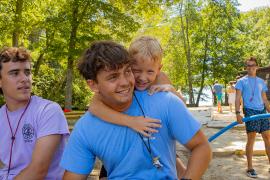Camp’s bells and whistles are great — vivid T-shirts, goofy chants, s’mores by the fire. But what really makes camp life so powerful are the human connections. Your staff have the power to create those bonds that stick with kids forever. But do we give counselors the tools they need to thrive in this crucial role?
Beyond logistics training, how can we grow counselors as whole people — their sense of purpose, their relationships, their inner resilience? The key is to start long before summer with proactive support and incorporate ongoing coaching all camp season.
Many of our staff are young adults still discovering themselves. Camp can become their testing ground for leadership. Let’s guide them to align camp values with their personal values.
According to the recent article “8 Ways Gen Z Will Change the Workforce” from The Stanford Report, Gen Z heavily prioritizes finding purpose and meaning in their work. Why this emphasis on purpose? Experts point to the declining importance of extrinsic motivators like pay and status for younger generations. Instead, they are driven by intrinsic motivators like personal fulfillment, values alignment, and professional development (De Witte, 2024).
Providing opportunities for self-reflection, skill building, and mentorship can tap into the desire for meaning and growth that Gen Z camp staff crave. Giving them the space to connect camp experiences with their own values and passions is key to keeping them engaged and motivated all summer.
Have pre-summer check-ins where counselors share their “origin stories.” What challenges shaped them? Who influenced them? This builds self-awareness.
Help staff articulate core values stemming from their experiences. Then craft “purpose statements” integrating their identity, values, and camp’s vision. Now you’ve anchored them in the deeper why before diving into the what and how.
For example, this might include:
- Self-reflection questions and journal prompts
- What are your top strengths, and how can you use them at camp?
- What are your core values? How do they tie to camp’s mission?
- What hopes and goals do you have for personal growth this summer?
- What motivates you most — working with kids, being outdoors, inspiring others?
- How can camp experiences help you work on self-improvement?
- What are your top strengths, and how can you use them at camp?
- Team building focused on vulnerability
- Play Two Truths and a Lie to practice vulnerability and honesty.
- Schedule shared story time to help counselors bond over life experiences.
- Institute emotional check-in circles so your team can express feelings and give support.
- Create an affirmation station with positive notes of encouragement.
- Play Two Truths and a Lie to practice vulnerability and honesty.
The focus on building connections and sharing authentically before you begin logistics training enables counselors to form support systems. This vulnerability strengthens their ability to care for campers socio-emotionally when challenges emerge.
Reinforce throughout training that camp teaches crucial life skills — such as self-awareness, problem-solving, and healthy risk-taking — to the campers, and also to the staff themselves. Camp counselors aren’t just babysitters; they are role models shaping lives.
Provide ongoing learning on how to build relationships, create safe environments, and manage behaviors positively. Don’t just lecture; have your team apply skills through role play. Additional ways you can bring this to life at your camp include:
- Schedule weekly or mid-summer one-on-one meetings with counselors to check in on energy, work-life balance, and feeling valued. Consistent coaching like this builds staff confidence and helps them feel supported at all times.
- Coach counselors in real time when challenges emerge. Observe interactions and provide feedback. Model responses. Customize extra support.
- Consider bringing in outside specialists, such as child development experts, therapists, or consultants, to provide training on how to build healthy relationships.
- Designate veteran counselor “mentors” who can give ongoing guidance and model appropriate leadership throughout the summer.
Camp directors and other leadership staff should offer counselors hands-on support instead of just handling crises. This could include shadowing on-duty staff, giving encouraging notes, and providing clear, solutions-oriented feedback and positive reinforcement.
This wrap-around approach requires more investment upfront — but the compounding benefits are worth it. Counselors gain purpose, community, and a tool kit for personal and professional growth. Kids feel secure and connected. And you reduce staff turnover.
This summer let’s move from just surviving to helping our counselors truly thrive. A little nurturing and modeling vulnerability goes a long way when empowering staff to create life-shaping experiences — for themselves and others. It all starts on the inside.
Photos courtesy of Camp John Marc, Dallas, TX, Camps Airy & Louise, Baltimore, MD, Roundup River Ranch, Gypsum, CO.
Reference
De Witte, M. (2024, February 14). 8 ways Gen Z will change the workforce. The Stanford Report. news.stanford.edu/stories/2024/02/8-things-expect-gen-z-coworker
Emily Dills, M Ed, is a passionate educator specializing in the areas of diversity and inclusion, social-emotional learning (SEL), and culturally responsive teaching. Emily served as a social-emotional learning coach for eight elementary schools in her district, where she supported leaders, staff, students, and families in mindfulness, educational neuroscience, and SEL curriculum. She now is a full-time educational consultant who partners with camps, after-school programs, childcare centers, and other community organizations. Learn more at emilydills.com.


